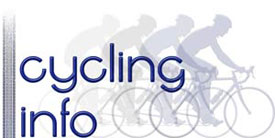Readers question: I check my bike the night before, lubricate, check gears, etc and tyre pressure. So far I have done a couple of sportives and I have noticed lots of cyclist checking their tyre pressure in the car park prior to starting. Am I ok doing it the night before or should I do it prior to starting? I can’t see overnight making that much difference.
For a sportive you probably want a tyre pressure of around 90-100 psi. If you do it the night before it should be fine for the next morning. (It’s then one less thing to worry about in morning) Just give a quick manual test with your thumb to make sure you don’t have any slow puncture or weak valve.
On my road bikes with ordinary inner tubes and tyres, I usually pump up the tyres about once a week. Before a ride, I will give a quick thumb test, if there is some softness in the tyres I will put air in. Usually, it means inflating from 85psi to around 95 or 100. For big rides, I particularly want to make sure I have the optimal tyre pressure.
Danger of Tyres Exploding.
Some say that if you blow your tyres upto a high pressure and leave in a hot car, there is a danger of the tyre exploding. I’m not sure how real this threat is, I’ve never come across anyone who has actually experienced this. But, it could be a reason for blowing up to the maximum tyre pressure on the morning of a race. However, I think this is more valid for a tubular or tyre where you blowing up to limits of the upper range of psi.
Tubular Tyre Pressure for Racing
When Racing, I often blow up the tubulars to over 160psi. Because it is such a high pressure, I will do this on morning of race and after race, will let some air pressure out as it is said to be better for tyres. But, then I sometimes have still done it the night before for really early morning starts. If I get an explosion in the middle of the night I will let you know.
Addition
I think the gains of very high PSI are pretty marginal but they do give a little benefit, which is useful if racing. It also depends on the type of cycling. Time trialling on smooth roads benefits from higher PSI. In track cycling, the tubulars may go up to 200PSI. I’m sure the top track Cycling teams have researched benefits of high PSI.
However, for road racing, you wouldn’t want such a high PSI as you will get better cornering at 90PSI than 150PSI. So there can be a trade off.
Related


> Dave
Thanks for sharing your unfortunate experience. I’ll take my own advise more seriously now.
> Jon
I think the gains are pretty marginal but they do give a little benefit, which is useful if racing. It also depends on the type of cycling. Time trialling on smooth roads benefits from higher PSI. In track cycling, the tubulars may go up to 200PSI. I’m sure the top track Cycling teams have researched benefits of high PSI.
However, for road racing, you wouldn’t want such a high PSI as you will get better cornering at 90PSI than 150PSI
Thank you very helpful….Lee
I have experienced inflating tyres to their max and then leaving the bike in full sun for a few moments, and the tyre exploding. So I would go along with not leaving the bike in a hot car.
Is there any reason why you pump your tubulars up to 160psi? I’ve read on a number of websites that inflating them that high doesn’t have any benefit, and if anything just makes the ride more uncomfortable. I’d be interested in knowing your reasoning behind it, I find at 100psi mine perform fine.
Long fast descents eg Col du Glandon can heat up the rims, and if your pressure its too high, can cause them to pop. Lots of riders on the Marmotte find this out every year, and have broken bones to prove it.
I always ride at 80psi unless I’m racing. 80psi is fine, and I’ve been puncture-free for 3 years.